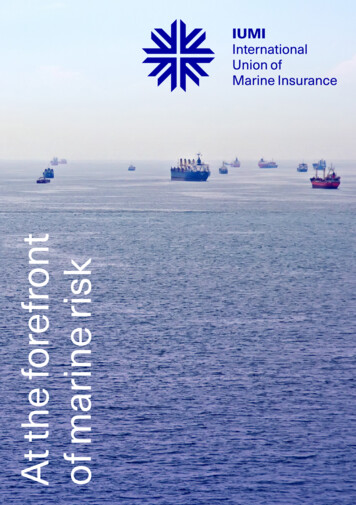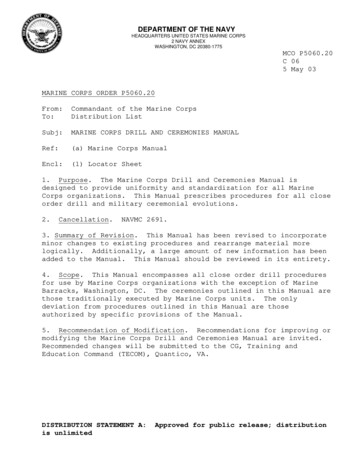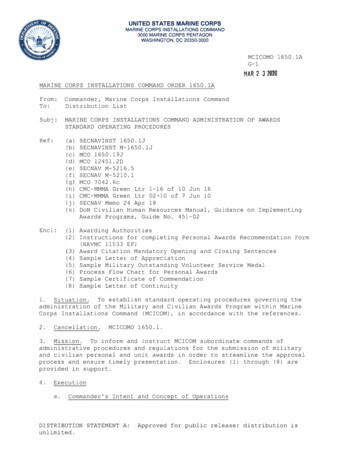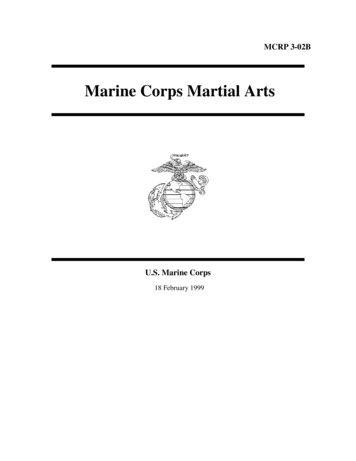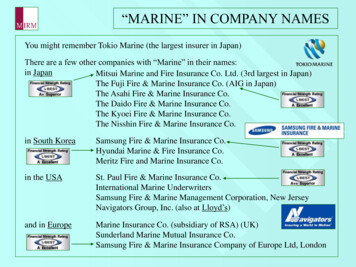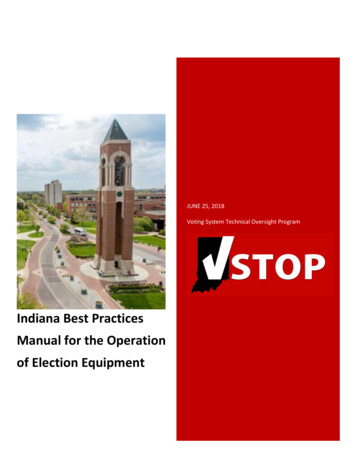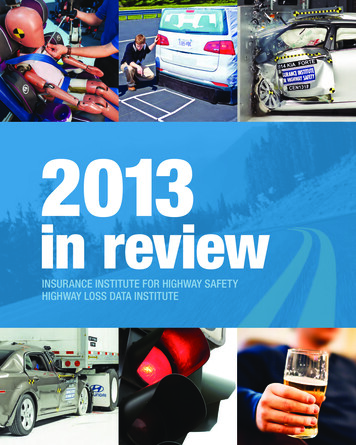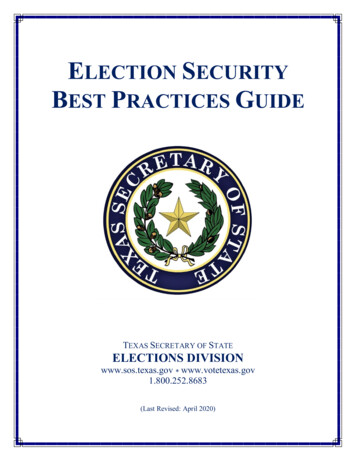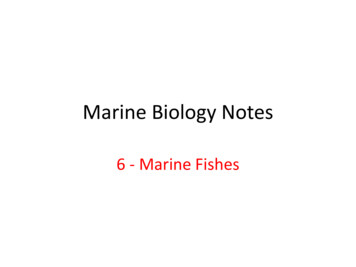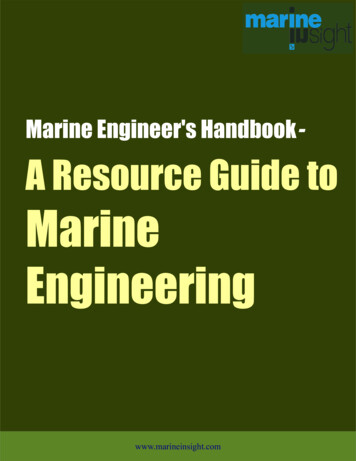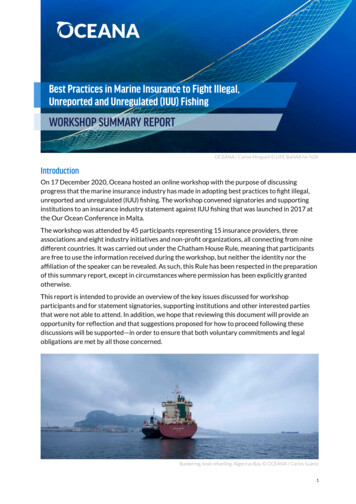
Transcription
Best Practices in Marine Insurance to Fight Illegal,Unreported and Unregulated (IUU) FishingWORKSHOP SUMMARY REPORTOCEANA / Carlos Minguell LIFE BaHAR for N2KIntroductionOn 17 December 2020, Oceana hosted an online workshop with the purpose of discussingprogress that the marine insurance industry has made in adopting best practices to fight illegal,unreported and unregulated (IUU) fishing. The workshop convened signatories and supportinginstitutions to an insurance industry statement against IUU fishing that was launched in 2017 atthe Our Ocean Conference in Malta.The workshop was attended by 45 participants representing 15 insurance providers, threeassociations and eight industry initiatives and non‑profit organizations, all connecting from ninedifferent countries. It was carried out under the Chatham House Rule, meaning that participantsare free to use the information received during the workshop, but neither the identity nor theaffiliation of the speaker can be revealed. As such, this Rule has been respected in the preparationof this summary report, except in circumstances where permission has been explicitly grantedotherwise.This report is intended to provide an overview of the key issues discussed for workshopparticipants and for statement signatories, supporting institutions and other interested partiesthat were not able to attend. In addition, we hope that reviewing this document will provide anopportunity for reflection and that suggestions proposed for how to proceed following thesediscussions will be supported—in order to ensure that both voluntary commitments and legalobligations are met by all those concerned.Bunkering, boat refuelling. Algeciras Bay. OCEANA / Carlos Suárez1
SETTING THE SCENEThe workshop began with an opening session where remarks were provided from Oceana and several otherassociations and initiatives.Oceana in Europe’s Executive Director Ms. Pascale Moehrle welcomed participants and provided a recapof the journey that Oceana has taken with the insurance sector so far. Since 2017 , the insurance industrystatement against IUU fishing put forth by both Oceana and UNEP’s Principles for Sustainable Insurance(PSI) initiative has gained the support of 36 insurance companies, clubs, associations and other stakeholders.Signatories to the statement publicly committed to: Encourage the adoption of measures that help to reduce and eliminate IUU fishing; Encourage the use of appropriate risk management protocols and effective due diligence procedures tohelp reduce the risk of insuring vessels or companies engaged in IUU fishing; and To not knowingly insure or facilitate the insuring of IUU fishing vessels.In 2019, Oceana and the PSI launched guidance to help signatories and other companies in meeting thesecommitments. This guidance was produced in consultation with stakeholders from the insurance sector,including insurers and associations. Ms. Moehrle explained that one of the purposes of the workshop was tolearn which of the recommendations included in the guidance are currently being used and to discuss howthey can be adopted more broadly.Ms. Moehrle also reminded workshop participants that in some countries, it is against the law to provideservices—including insurance—to IUU fishing vessels1, presenting a map of countries where such legalrequirements are in place. As such, the workshop was intended to not only uncover information that can beused to help protect our ocean, but also to advise participants on how to live up to their legal obligations.Countries that are requiredto prevent companies fromproviding services to IUU fishingvessels because of RFMO rulesContracting Parties (CPCs)*Cooperating non-contractingParties (CNCPs)*AlbaniaBosnia andHerzegovinaMontenegroRepublic ofMoldovaNorwayRussian FederationUnitedKingdomUkraineEuropeanUnionUnited Statesof f CubaAlgeriaSint MarteenLibyaPeople's Republicof ChinaLebanon SyriaIsraelEgyptJordanRepublicof PanamaCook IslandsThailandSeychellesRepublicof LiberiaRepublic ofEcuadorComorosBrazilMayotteMauritiusRepublicof PeruNamibiaRepublicof CuraçaoRepublicof KoreaUruguaySouth AfricaFrenchSouthern LandsRepublic ofVanuatuAustraliaNewZealand**to regional fisheries management organisations (RFMO) where requirements are in place1 Lists of vessels that have engaged in IUU fishing have been adopted by 13 regional organisations with mandates to manage internationallyshared fishing stocks or areas. Information on all listed IUU vessels can by found on the Combined IUU Fishing Vessel List: www.iuu‑vessels.org,maintained by the Norwegian not‑for‑profit organisation Trygg Mat Tracking (TMT).2
OCEANA LXMs. Hendrike Kühl, Policy Director for the International Union of Marine Insurance (IUMI) took the floorfollowing Oceana to offer a few points of reflection. IUMI attended the first workshop held by Oceana onthis topic in 2017, where initial steps were taken to involve the marine insurance industry. Since then, muchprogress has been made and Oceana’s presentation at the 2019 annual IUMI meeting was a key step inraising awareness. At the end of that year IUMI received a strong mandate from their members to look intoEnvironmental, Social and Governance (ESG) issues including IUU fishing, preferring objectives to be tangiblerather than aspirational. Ms. Kühl highlighted concerns over the long‑term viability of the fishing industry,referring to a recent report by the UN’s Food and Agriculture Organization (FAO). Further, she noted thatIUU fishing is also a social justice issue, and that INTERPOL has stated that IUU fishing can be linked to othercrimes including money laundering, labor exploitation and corruption. IUMI is keen to continue supportingOceana’s work in developing practical and concrete strategies to help prevent these illegal practices fromhappening.Following IUMI, Mr. Dennis Fritsch, Project Coordinator for the UN’s Sustainable Blue Economy FinanceInitiative provided a few remarks. Financial institutions recognize that they can have a sizeable impacton the health of the ocean, and they have a unique opportunity to steer ocean‑linked industries towardssustainability. The Sustainable Blue Economy Finance Initiative encourages banks, insurers and investorsto build sustainable practices into their decision-making processes and to also engage with their clients onthese topics. Guidelines developed through the initiative for five sectors of the blue economy were launchedin early 2021. Mr. Fritsch concluded by welcoming the submission of case studies from financial institutions,as they wish to promote practical examples of new policies or processes that are being implemented withinthe financial sector.Concluding the opening session of the workshop, Ms. Karen Sack, President and CEO of Ocean Unite andCo‑Chair of the Ocean Risk and Resilience Action Alliance (ORRAA), provided an overview of ORRAA’swork, also underlining the significance of the issue being discussed. ORRAA is a multisector collaboration,mobilizing governments, financial institutions, conservation organizations, communities and otherstakeholders with the goal of unlocking finance to mitigate the effects of climate change and ocean risk. Toend IUU fishing, a multi‑sector approach is needed and removing access to insurance by those that engage inthis practice is one important lever for change. There is a clear business case for this, as vessels that engagein IUU fishing are more likely to participate in risky behavior that could result in costly claims. ThroughORRAA, AXA and Ocean Unite are leading a project pursuing three pathways:3
1) Assessing the feasibility of requiring insured vessels to have International Maritime Organisation (IMO)numbers;22) Evaluating the potential of developing a rapid risk assessment tool for underwriters; and3) Reinforcing insurance policy wordings to remove insurance support for fishing vessels engaged in IUUactivity.This project builds on the work of Oceana and UNEP’s PSI Initiative and project partners include Oceana,Global Fishing Watch, Trygg Mat Tracking and the UN Finance Initiative.The detained and CCAMLR blacklisted IUU fishing vessel Antony, in the port of Vigo, Galicia, Spain. OCEANA / Dana MillerRESULTS OF PRE-WORKSHOP SURVEYThe results of a pre-workshop survey sent to all statement signatories and supporting institutions werepresented by Dr. Dana Miller, Senior Policy Advisor for Oceana. The main findings of the survey were thefollowing: Less than half of respondents reported that they have a process or check in place to ensure that vesselsofficially sanctioned for their involvement in IUU fishing are not given access to insurance services. Available tools for identifying IUU fishing or higher risk vessels are underutilised (e.g. the Combined IUUvessel list, IUU Fishing Risk Assessment Checklist, Global Fishing Watch). All but one respondent expressed interest in the creation of a tool or mechanism that facilitates anexchange of information on IUU fishing vessels. There is interest to take other ideas forward (in order of decreasing interest):o Policy wording excluding coverage for vessels switching off tracking.o Requiring insured vessels to have tracking systems.o Policy wording excluding coverage for vessels engaged in IUU fishing.o Requiring insured vessels to have IMO numbers.o Treating vessels registered under flags of convenience (FoCs) and vessels owned by shellcompanies with greater scrutiny (some respondents indicated this is already considered).The full survey results have been provided as an Annex to this report.2An IMO number is a unique vessel identification number that once assigned, remains with the vessel throughout its lifetime regardless ofchanges in name, flag or ownership. The absence of this number facilitates concealment of ownership, and histories of fines or other sanctions.Although fishing vessels are not required to be registered with an IMO number under international law, it is a common characteristic for IUUvessels to not have one. IMO numbers are free to obtain through information service provider IHS Markit.4
SHARING OF TOOLS AND PROCESSES TO COMBAT IUU FISHINGPresentations were then welcomed by workshop participants, sharing tools and processes that are currentlybeing used or can be used to identify and avoid contracts with IUU fishing vessels.Introducing the session, Dr. Miller from Oceana made an announcement regarding a recent advancementwhere starting in early 2021, IUU fishing vessel data obtained through Trygg Mat Tracking’s (TMT)Combined IUU Fishing Vessel List https://iuu-vessels.org/ will be integrated into IHS Markit’s extensive Seaweb Ships database and recently launched Maritime Intelligence Risk Suite (MIRS). This advancement wasfacilitated through a collaboration between IHS Markit, Oceana and TMT.Following Dr. Miller’s announcement, Mr. Duncan Copeland, Executive Director for TMT and Tony Long,CEO for Global Fishing Watch, gave a presentation on the concept of a rapid assessment tool that couldbe developed to assist insurers in identifying and avoiding high risk vessels with potential links to IUUfishing. Mr. Copeland explained that fishing vessel registration and operational data requirements varyfrom country to country and this can present challenges in linking individual vessels and their owners to avessel’s historical record of compliance. To facilitate illegal fishing, a single vessel can operate under multipleidentities and one identity can be used by multiple vessels. Consolidated information on fishing vessels isscarce, creating a system where illegal activities can easily be hidden. TMT works globally with governments,agencies and international bodies and maintains the Combined IUU Fishing Vessel List, a public resourcethat compiles information from various Regional Fisheries Management Organisations (RFMOs). Thislist represents only a subset of IUU fishing vessels and is fed by a larger internal system created by TMTcontaining a global overview of fishing vessels including several thousand with compliance issues. Thisdatabase allows for the mapping of the ownership structure of vessels using thousands of data sources,creating the best‑known picture of vessel identity, ownership and risk.Mr. Long then explained the role of Global Fishing Watch, as a transparency platform founded by Sky Truth,Google and Oceana that brings vessel position and authorisation into the public realm. This helps to improvecompliance as these vessels increasingly know they are being watched. In the last number of years there hasbeen a shift in transparency, with the governments of Indonesia, Peru, Panama, Chile, Costa Rica, Ecuadorand likely Senegal and Namibia in 2021 sharing tracking data with the platform.Mr. Long and Mr. Copeland outlined the possibility of developing a rapid risk assessment tool, combining thepower from Global Fishing Watch with vessel identification and risk data from TMT. A common interfacewould allow users to perform a quick, automated initial risk assessment and would flag if TMT has additionalinformation which could then be requested in the form of an intelligence report.Illegal driftnetter in the Aeolian islands. OCEANA / Juan Cuetos5
Speaking on behalf of AXA, Mr. Chip Cunliffe, Director of Sustainable Development at AXA XL and co-chairof ORRAA and Ms. Lindsay Getschel, Sustainable Development Assistant, provided an overview of AXA’sinvolvement in ORRAA (as introduced previously by Ms. Sack from Ocean Unite) and efforts to deliver ontheir commitments as a signatory to the 2017 industry statement. ORRAA’s focus is on identifying the risksof a changing ocean and exploring how insurance and other finance solutions can be used to mitigate thoserisks. The alliance works collaboratively on projects with policy makers, the scientific community and NGOs.For the past six to nine months, AXA has been working through ORRAA on a project with Oceana, TMT andGlobal Fishing Watch to identify and develop ways to remove inadvertent insurance support for IUU fishing.The project aims to reduce IUU fishing as an ocean risk multiplier, also benefiting businesses through helpingthem to reduce the likelihood of claims, avoid legal liabilities and live up to their commitments and intentionsto be good actors. Through this project, AXA is helping to develop three different pathways to reduce accessto insurance, as described previously by Ms. Sack: IMO number requirements; the development of a rapidrisk assessment tool; and enhanced policy wordings. In 2021, AXA International New Markets (INM) will bepiloting a process to assist clients in acquiring IMO numbers and is also looking into piloting the rapid riskassessment tool, described previously.Mr. Matthew Ginman, P&I Underwriter for British Marine, then provided a presentation outlining themeasures his firm has put in place to improve due diligence since signing the industry statement in 2017.British Marine concentrates their business on smaller vessels and of the over 10,000 vessels they insure,about 2,000 are fishing vessels. Making use of TMT’s Combined IUU Fishing Vessel list, they have introduceda simple screening procedure. Providing two vessels as case study examples, Mr. Ginman explained that ifthey find a match, they inform TMT and it leads to both an investigation and cancellation of coverage. Vesselswithout IMO numbers create a greater challenge as an additional level of due diligence is required to verifya match. British Marine welcomes the integration of IUU fishing vessel data into IHS Markit’s Sea‑webdatabase (as announced earlier by Dr. Miller from Oceana) but are concerned that if they cancel cover to avessel, nothing stops it from getting access to insurance elsewhere. They also find that it is difficult to shareinformation as there is no mechanism in place for this. Smaller vessels tend to not have IMO numbers or AISvessel tracking systems, making these vessels more challenging to assess.The Atlantic Wind in the port of Mindelo, Cape Verde. OCEANA / SGA6
OCEANA / Juan CuetosDISCUSSIONThe presentations were followed by a session of open discussion which has been summarized here, groupingcomments into the broad themes discussed.Achieving wider uptake of guidanceConcerns were raised over the poor uptake of the existing guidance for how to avoid contracts with IUUfishing vessels, as suggested by the results of the pre‑workshop survey. Although most respondents are notscreening vessels against the IUU fishing vessel list, it was acknowledged that this should be part of everyinsurers ‘Know Your Customer’ practice, particularly given that accessibility to this public list is not limitedby the EU’s General Data Protection Regulation (GDPR) restrictions.Comparing the situation to efforts directed at addressing climate change, a parallel was drawn with the needto reduce greenhouse gases, not shift them. Questions were posed over what barriers were preventing theimplementation of recommendations and what is needed to overcome these. Can brokers, re‑insurers,insurance regulators and market associations have a greater role in having the guidance more broadlyadopted within the industry?A suggestion followed to generate a widely available list of companies that have the adequate processes inplace. This would create pressure for others to follow suit. It was also noted that involving the entire chainof service providers including brokers, re‑insurers and surveyors is relevant to addressing concerns overguidance uptake. None of these actors would willingly insure or support an IUU fishing vessel.An interesting case was referred to where a corrupt scallop fishery in New Bedford had operated inplain sight for years, avoiding prosecution due to its vertically integrated structure. A concern was raisedthat although there are responsible actors trying to do the right thing, there are still brokers that don’tunderstand the ethical issues involved and undercut those that do by offering cheaper prices. How can weaddress this?In response, it was suggested that perhaps there is the potential to develop a race to the top, as leadersin the sector set the terms for what responsible insurers are doing and can help to drive positive changein this way. A desirable outcome was also expressed for seeing a united front as responsible actors moveforward together. Retailers and banks for example, are already seeking to remove risks in their supply chainsand loans. There are many issues associated with IUU fishing and a number of different pathways can bepursued to address it, including improvements to governance and regulations. There is nosilver bullet, but the insurance industry does have an important role to play.7
Raising awareness is key and it was recognized that the message needs to be spread further, possiblythrough webinars and engagement on a more local level with national insurance associations. Lack ofawareness is the first barrier to overcome. If a vessel was caught in an illegal activity in the past, thisshould be a warning sign for insurers, indicating a higher risk vessel. The risk indicators of unreported andunregulated fishing are not as clear and it would be helpful if greater awareness was raised on these as well.To effectively drive change more broadly within the sector however, there needs to be leadership and it wassuggested that within this group there might exist this possibility.Improving due diligence and increasing transparencyAcknowledging that both reputational and legal risk remain important incentives, it was noted that thecreation of an easy‑to‑use rapid risk assessment tool could create improvements where companies werenot taking action previously. There are already tools available such as the IUU fishing vessel list, but muchmore information is available that can add to this. A rapid risk assessment tool could be a useful and quickway to help insurers weed out the companies still associated with IUU fishing and thus avoid illegallyproviding them with services. Furthermore, if there is a change in a vessel’s name or area of operation therecould be the potential for users to receive an alert. While reactive strategies such as these were welcomed,a question was posed over what proactive measures can be taken. Additionally, concern was shared over thelikelihood that vessels without insurance will continue to fish and there is a need to address the activities ofthe Chinese distant-water fleet, which may not all be insured.Regarding efforts to increase transparency and the idea of requiring insured vessels to have IMO numbers, acomparison was drawn to cars needing license plates. It was suggested that a public awareness campaign andleadership from the industry could help to extend the coverage of IMO numbers. However, it was highlightedthat this is a two-tier issue, involving international vs. local fleets and it is necessary to consider that someinsurers provide services only to their local market. Having an IMO number is an extra tool to assist duediligence, but it was noted that this will not necessarily stop those who wish to engage in IUU fishing.Checking the IUU fishing vessel list and using tools like Global Fishing Watch are the best course of actionfor underwriters and brokers as the threat of a criminal record should be enough for most underwritersto pause, certainly those operating under English law3. Regardless, it was further noted that broad scaleadoption of IMO numbers will help to increase transparency generally in the fishing sector, which wouldleave the bad actors with less of an ability to hide. Additionally, if insurers were to obtain these numbers fortheir clients, this process would assist risk assessment, uncovering higher risk vessels lacking the sufficientinformation to qualify for a number.Additional strategiesAlthough the insurance industry can have an important role to play, it was noted that other factors should beconsidered. All IUU fishing and fraud begins with the involvement of agents and a busy port with a reputationfor lax enforcement is a good predictor of laundering illegal catches. Policing also plays a significant role,but we need to more easily be able to identify those engaging in IUU fishing. We have to start rewardingcompliance and not accepting vessels to port that have missing data or records. In some regions there is aneed for building capacity to implement the FAO’s Port State Measures Agreement. Additionally, wherepossible, observers at sea should be capacitated to improve cross‑checking of fishing vessels, and fisheriesgovernance frameworks should be strengthened in order to deter and stop IUU fishing. Where there ispoverty, people will fish illegally, and wealthier countries need to step in to help address it, also noting theirroles as market and flag states. For certain countries it is an issue of food security. There is a tendency toclone policies from one country to another, which might not be the most successful strategy. A few thingsthat should be universally sought in any dealings include public tracking, IMO numbers, public authorizedvessel and transshipment lists, electronic catch documentation and where possible, camera monitoring.3Providing insurance to IUU fishing vessels is an offence under both UK and European law.8
The Antillas Reefer in the port of Santa Eugenia de Ribeira, Coruña, Spain. OCEANA / LXRESULTS OF POLLING QUESTIONSTo wrap up and gather an indication of the views of the workshop participants on the key issues discussed,four polling questions were posed, the results of which are shown below.1. Would the creation of a tool or mechanism that facilitates an exchange of information on IUU fishingvessels be of interest to you?a. Yes – 83% (15)b. No – 11% (2)c. Maybe – 5% (1)2. Would the development of a Rapid Assessment Tool to assist with risk management be of interest toyou?a. Yes – 94% (18)b. No – 5% (1)c. Maybe – 0% (0)3. Do you think insurers can have a role in reducing IUU fishing through increasing transparency withinthe fishing sector?a. Yes – 42% (9)b. No – 0% (0)c. Maybe – 57% (12)4. Do you think the wider adoption of tools or strategies to identify and avoid contracts with IUU fishingvessels can be achieved?a. Yes – 65% (15)b. No – 0% (0)c. Maybe – 24% (8)9
CONCLUDING REMARKS AND NEXT STEPSIn closing the workshop, a few concluding remarks were provided by Dr. Miller on behalf of Oceana andinformation regarding the next steps that will follow the workshop were communicated: Sharing of a summary report from the workshop Invitation to join a working group to develop policy wording or test tools Development of an information-sharing mechanism and other tools Development of a website landing page, taking into consideration the interests and needs discussedduring the workshop Promotional activities and additional workshops or eventsBunkering tanker in the Bay of Gibraltar. OCEANA / Carlos Suárez10
ANNEX – PRE‑WORKSHOP SURVEY RESULTS1. Do you have a process or check in place to ensure that vessels officially sanctioned for theirinvolvement in IUU fishing are not given access to insurance services?a. Yes – 36% (4)b. No – 67% (7)2. If you answered ‘yes’ to Q1, please elaborate: New vessels checked prior to quoting. Monthly exceptions report run against currentvessels to monitor any additions to the RFMO IUU list. We do use an online based search tool for general sanctions. Underwriters do use thesearch function on https://www.iuu‑vessels.org/ Underwriters must check IUU fishing blacklists through the Combined IUU Vessels List andthe EU IUU Vessel List. If vessels appear on the IUU list we liaise with the owner/operator to establishcircumstances and we act accordingly after investigating the circumstances.3. Do you consult the ‘IUU fishing risk assessment checklist’ included in the PSI and Oceanaguidelines booklet when conducting due diligence checks on fishing vessels or refrigerated cargovessels?a. Yes – 27% (3)b. No – 73% (8)4. Do you refer to data obtained through the Combined IUU Fishing Vessel List (iuu‑vessels.org)when conducting due diligence checks on fishing vessels or refrigerated cargo vessels?a. Yes – 45% (5)b. No – 55% (6)5. Do you have a subscription to a data platform that contains information on IUU fishing?a. Yes – 27% (3)b. No – 73% (8)6. If you answered ‘yes’ to Q5, what is the name of this data platform? World-Check World-Check One7. Do you have a subscription to IHS Markit’s Sea‑web or Marine Intelligence Risk Suite (MIRS)platform?a. Yes – 50% (5)b. No – 50% (5)8. Do you require insured fishing vessels (of at least a minimum size) to be registered with an IMOnumber?a. Yes – 36% (4)b. No – 64% (7)9. If you answered ‘no’ to Q8, do you think you might consider implementing such a policy?a. Yes – 33% (3)b. No – 44% (4)c. N/A as a policy is already in place – 22% (2)11
10. Do you require insured fishing vessels (of at least a minimum size) to be equipped with AIS orVMS vessel tracking devices?a. Yes – 9% (1)b. No – 91% (10)11. If you answered ‘no’ to Q10, do you think you might consider implementing such a policy?a. Yes – 45% (5)b. No – 27% (3)c. N/A as a policy is already in place – 27% (3)12. Do you use advisory (re)insurance policy wording (e.g. warranty, clause) that explicitly excludescoverage of vessels if it is determined that legally required tracking technology (such as VMS andAIS) was not in use at the time of an incident for which a claim is being made?a. Yes – 27% (3)b. No – 73% (8)13. If you answered ‘no’ to Q12, do you think you might consider implementing such a policy?a. Yes – 45% (5)b. No – 9% (1)c. N/A as a policy is already in place – 45% (5)14. Do you ever refer to the vessel tracking platform Global Fishing Watch (globalfishingwatch.org)for information on where fishing vessels have been operating or to find out whether they use AISvessel tracking?a. Yes – 27% (3)b. No – 73% (8)15. Do you use advisory (re)insurance policy wording (e.g. warranty, clause) that explicitly excludescoverage of vessels engaged in IUU fishing and/or fishery products caught by these vessels—whether as catch or cargo—that have been lost or damaged at sea, and/or denied entry intomarkets on the grounds of having IUU origin? Check all that apply.a.b.c.d.Vessels – 67% (8)Catch – 42% (5)Cargo – 33% (4)None – 33% (4)16. If you answered ‘none’ to Q15, do you think you might consider implementing such a policy?a. Yes – 44% (4)b. No – 11% (1)c. N/A as a policy is already in place – 44% (4)17. Do you treat fishing vessels registered under flags of convenience and owned by shell companiesin offshore tax havens with greater scrutiny?a. Yes – 73% (8)b. No – 27% (3)18. If you answered ‘no’ to Q17, do you think you might consider implementing such a policy?a. Yes – 25% (2)b. No – 13% (1)c. N/A as a policy is already in place – 63% (5)12
19. Out of all the tools or risk control options recommended within the Oceana and PSI guidelinesbooklet, which do you think is the most effective at identifying higher risk vessels? IUU vessel list, IMO registration and VMS/AIS tracking. Consult the IUU fishing risk assessment checklist when conducting due diligence. IUU List, Flag, Absence of License, Area, Species. For underwriters in their daily business the IUU fishing list. The vessels check checklist. Consult the IUU fishing risk assessment checklist when conducting due diligence. Having richer information in place is a key aspect towards combating IUU fishing. Sopublicising the checklist (Risk Control Option 1) is an excellent way of promoting goodpractice. The provisions on excluding cover are probably less effective in the sense thatpolicies will already exclude criminal behaviour, so there are already protections in place.Risk Options B and C are mostly reactive, responding when the IUU fishing has occurredand it is u
1) Assessing the feasibility of requiring insured vessels to have International Maritime Organisation (IMO) numbers;2 2) Evaluating the potential of developing a rapid risk assessment tool for underwriters; and 3) Reinforcing insurance policy wordings to remove insurance support for fishing vessels engaged in IUU activity.
